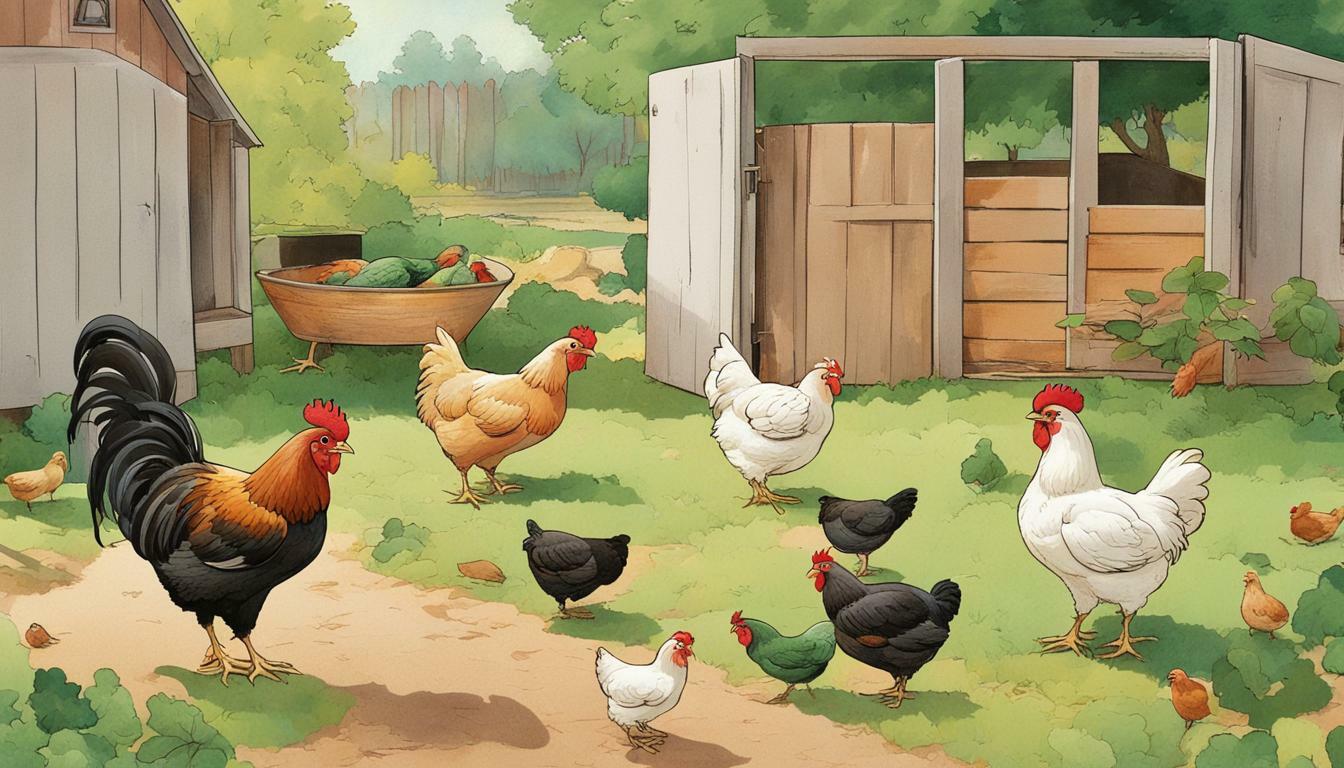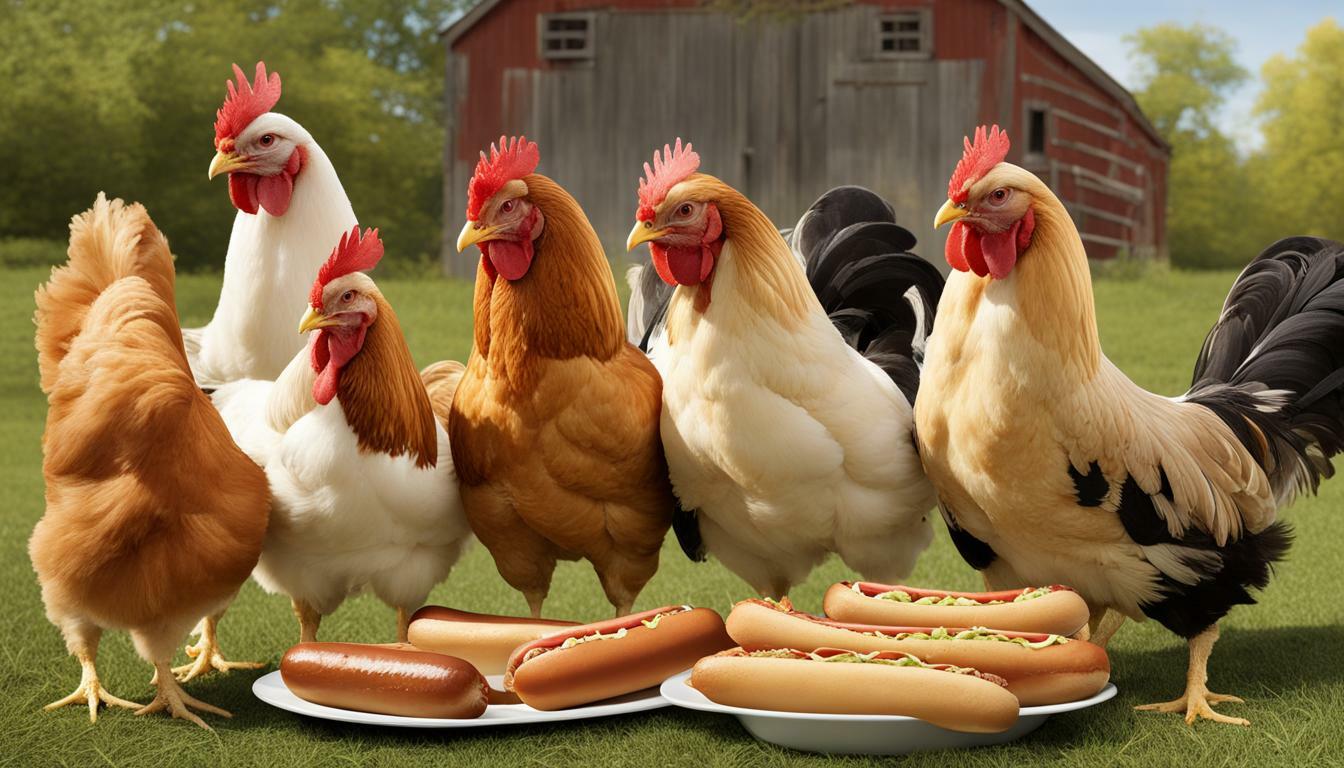Can Chickens Eat Mustard Greens? Find Out Here!

Table of content:
- Are Mustard Greens Good for Chickens?
- What Greens Can Chickens Eat?
- What Vegetables Can Chickens Eat?
- What Can I Feed My Chickens from My Garden?
- Are Mustard Greens Safe for Chickens?
- How Much Mustard Greens Can Chickens Eat?
- Do Chickens Like Mustard Greens?
- What are the Benefits of Feeding Chickens Mustard Greens?
- When Can I Start Feeding Mustard Greens to Baby Chicks?
- Final Thoughts
Chickens are fun pets to keep in your backyard flock. Their egg-laying abilities make them productive as well. As a chicken owner, you want to make sure your feathery friends get optimal nutrition from their diet. One common question chicken owners have is whether chickens can eat mustard greens. Let’s find out!
Are Mustard Greens Good for Chickens?
Mustard greens are indeed safe and healthy for chickens to eat. These leafy greens contain many key vitamins and minerals chickens need to stay healthy:
- Vitamin A for good eyesight and immune function
- Vitamin K for blood clotting
- Vitamin C for collagen production and immunity
- Calcium for bone strength
- Iron for oxygen circulation
- Magnesium for enzyme production
- Potassium for fluid balance
- Fiber for digestion
The rich green color of mustard greens indicates high levels of antioxidants like lutein. Antioxidants remove free radicals from the body to reduce inflammation and cell damage.
Overall, mustard greens are packed with nutrition to support your flock’s health. They make an excellent supplemental food for chickens along with their regular feed.
What Greens Can Chickens Eat?
In addition to mustard greens, chickens can eat a wide variety of green leafy vegetables:
- Kale
- Collard greens
- Swiss chard
- Beet greens
- Turnip greens
- Spinach
- Lettuce
- Bok choy
- Broccoli and cauliflower leaves
- Herb leaves like parsley, basil, dill, cilantro
Leafy greens provide hens with extra vitamins, minerals, and antioxidants. They add variety to your flock’s diet. Greens are also a source of moisture to keep chickens hydrated.
Aim to feed chickens 1-2 cups of chopped greens per hen daily. Introduce new greens slowly and watch for digestive issues. Remove any old, wilted greens chickens that don’t eat promptly.
What Vegetables Can Chickens Eat?
Aside from leafy greens, chickens can eat lots of garden vegetables:
Fruits:
- Tomatoes
- Peppers
- Squash
- Pumpkin
- Berries
- Melons
Roots:
- Carrots
- Sweet Potatoes
- Potatoes
- Yams
- Turnips
- Beets
Other:
- Corn
- Peas
- Green Beans
- Broccoli
- Cauliflower
- Brussels Sprouts
- Celery
- Asparagus
- Cucumbers
- Zucchini
- Radishes
Vegetables provide nutrients like vitamin C, vitamin K, potassium, antioxidants and fiber. Offer chickens a variety of veggies 2-3 times per week. Chop or mash them into bite-sized pieces.
Remove any old veggies not eaten the same day to avoid rotting. Don’t feed chickens raw potato peels or green potato skins as they contain solanine, a toxic glycoalkaloid.
What Can I Feed My Chickens from My Garden?
If you grow fruits, vegetables, herbs, or greens in your garden, your chickens will happily eat the extras! Here are some chicken favorites:
- Romaine lettuce
- Kale
- Carrot tops and peelings
- Beet tops
- Swiss chard
- Spinach
- Arugula
- Radish tops
- Turnip greens
- Pea plants and vines
- Squash vines and flesh
- Zucchini
- Cucumbers
- Melons
- Pumpkins
- Broccoli stalks and leaves
- Cauliflower leaves
- Tomato vines and overripe tomatoes
- Pepper plants and spoiled peppers
- Corn silks and cut off cob bits
- Bean plants and excess green beans
- Herb leaves and flowers
- Berries
- Apples, pears, peaches (pits removed)
- Citrus fruits
- Potatoes
- Sweet potatoes
Clean all garden produce well. Avoid using chemical pesticides or fertilizers.
Feed chickens garden extras daily. This provides free nutrition and reduces your food waste!
Are Mustard Greens Safe for Chickens?
Mustard greens are 100% safe for chickens to consume. All varieties of mustard greens like green mustard, red mustard, or purple mustard can be fed to chickens with no issues.
Some key advantages of mustard greens for chickens include:
1. Non-Toxic
Mustard greens contain glucosinolates which can form goitrogenic compounds. However, research shows the levels in mustard greens are far too low to cause any thyroid problems in chickens who eat them.
2. Pesticide-Free
Make sure any store-bought mustard greens are certified organic. This ensures they are free of dangerous pesticide residues. Better yet, grow your own mustard greens or use ones from your garden.
3. Easy to Digest
Mustard greens are easier for chickens to digest than cruciferous veggies like broccoli, cabbage, or brussels sprouts. The leaves have a gentle flavor as well.
As long as you introduce mustard greens slowly, chickens have no trouble digesting them fully.
4. Improve Egg Yolk Color
The nutritious carotenoids like lutein in mustard greens transfer to chicken egg yolks. This makes the yolk a richer golden orange color.
How Much Mustard Greens Can Chickens Eat?
Chickens can eat mustard greens daily as part of a balanced diet. Follow these feeding guidelines:
- Gradually introduce mustard greens over 1-2 weeks. Start with just a few leaves, then slowly increase the amount. This prevents digestive upset.
- Chop mustard greens into bite-sized pieces for easier eating and digestion.
- Feed 1-2 cups of chopped mustard greens per adult chicken per day. Adjust amounts based on your flock’s appetite and egg production level.
- For chicks under 6 months old, feed mustard greens in smaller quantities 2-3 times per week. Young immune systems are still developing.
- Provide plenty of fresh water to wash down the slightly spicy mustard greens.
- Serve mustard greens alongside other leafy greens for variation. Rotate different types daily.
- Remove any wilted or uneaten mustard greens at the end of the day. Don’t leave leftovers sitting in coops overnight.
Following these tips will keep your flock happy and healthy while enjoying nutritious mustard greens!
Do Chickens Like Mustard Greens?
The answer is a resounding yes – chickens LOVE mustard greens! Here’s why mustard greens are a hit with most backyard chickens:
Color and Texture
Chickens are naturally attracted to the bright green color and leafy texture of fresh mustard greens. This stimulates their foraging instinct.
Cabbage Family
Since mustard greens are part of the nutrient-dense cabbage family, chickens recognize them as a healthy food source.
Natural Flavor
The tangy, mustardy flavor of these greens is pleasing to a chicken’s palette. The spiciness adds complexity missing from bland chicken feed.
Fun Treat
For free-range chickens, finding mustard greens in the garden is an exciting daily activity and treat. It satisfies their natural desire to scratch, peck, and forage.
Some picky chickens may ignore mustard greens at first. But the flock will usually acquire a taste for this vitamin-packed vegetable over time.
What are the Benefits of Feeding Chickens Mustard Greens?
Here are some of the top benefits chickens get from eating mustard greens:
- Vitamins A, C, and K – Necessary for immunity, circulation, bone/egg health
- Antioxidants – Lutein protects chickens’ eyesight and tissues
- Calcium – Helps build strong bones and eggshells
- Iron – Boosts blood cells carrying oxygen throughout the body
- Magnesium – Essential for energy production and enzyme function
- Potassium – Important for fluid balance, nerve transmission, and muscle health
- Fiber – Facilitates digestion and nutrient absorption from other foods
- Hydration – Leafy greens supply moisture to keep chickens well-hydrated
- Texture and Color – Stimulates chickens’ natural foraging behaviors and instincts
Feeding mustard greens makes chickens healthier and happier! This leafy green veggie is definitely a win.
When Can I Start Feeding Mustard Greens to Baby Chicks?
You can start offering small amounts of mustard greens to chicks once they are 2-4 weeks old. Here are some tips on feeding mustard greens to baby chicks:
- Wait until chicks are fully feathered out at 2-4 weeks old before feeding greens. Their digestive systems need time to mature.
- Introduce mustard greens slowly to avoid diarrhea or constipation. Start with just a few tiny pieces.
- Chop mustard greens into fine, chick-sized bites. They will have trouble swallowing bigger pieces.
- Feed greens alongside chick starter feed to aid digestion. Greens should not exceed 10% of daily intake.
- Offer just 1-2 tablespoons of chopped greens 2-3 times per week at first. Gradually increase frequency and portion sizes as chicks grow.
- Provide fresh cool water at all times to support digestion of leafy greens.
- Monitor chick droppings for any issues and adjust amounts of greens fed accordingly.
- If chicks show no interest in mustard greens, try again in a week. Some take longer to acquire the taste.
Gradually transition chicks to the adult chicken diet of unlimited greens by 16-18 weeks old. Daily mustard greens will keep your chicks happy and growing!
Final Thoughts
In summary, mustard greens are a nutritious supplemental food that provides great benefits for chickens of all ages. The vitamins, minerals, and fiber will help keep your flock in top health. Plus, chickens find the taste and texture very appealing compared to commercial feed. Mustard greens are the ultimate chicken superfood!
Welcome. I’m Adreena Shanum, the proud owner of this website, and I am incredibly passionate about animals, especially poultry. I founded adreenapets.com as a labor of love, stemming from my desire to share my knowledge and experiences with poultry enthusiasts worldwide.




